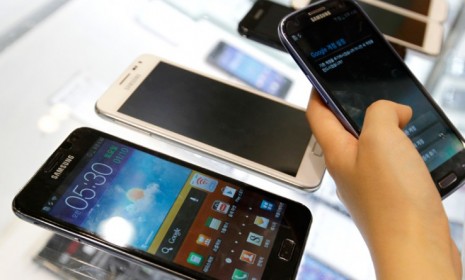Apple's massive patent victory over Samsung: Winners and losers
A jury says Samsung copied the iPhone's design and features — and the verdict is reverberating throughout the tech world

A free daily email with the biggest news stories of the day – and the best features from TheWeek.com
You are now subscribed
Your newsletter sign-up was successful
Apple has emerged victorious in what has been called the patent trial of the century. A jury in San Jose, Calif., ordered Samsung to pay $1 billion in damages for copying the iPhone, finding that Samsung's popular line of smartphones aped the iPhone's rectangular shape with rounded edges, as well as its "pinch-to-zoom" feature that allows users to magnify a page with the swipe of two fingers. And it could get worse for the South Korean company: Courts could still jack up the damages to $3 billion and block sales of Samsung products. The verdict has sent shock waves through an industry in which many of the iPhone's designs and features have become the norm, and the case's impact will surely extend beyond Apple's rivalry with Samsung. Here, a brief rundown of the key winners and losers:
LOSERS
Samsung
The Week
Escape your echo chamber. Get the facts behind the news, plus analysis from multiple perspectives.

Sign up for The Week's Free Newsletters
From our morning news briefing to a weekly Good News Newsletter, get the best of The Week delivered directly to your inbox.
From our morning news briefing to a weekly Good News Newsletter, get the best of The Week delivered directly to your inbox.
In addition to the monetary hit and possible sales injunction, Samsung "will be forced to quickly design around Apple's patents in its current and upcoming devices," says Farhad Manjoo at Pando Daily — or potentially "pay a steep licensing fee." And Apple's innovations, such as the pinch-to-zoom function, are so common that Samsung's future phones may seem like "cars with square or triangular steering wheels," says Nick Wingfield at The New York Times.
"There was an elephant in the courtroom" when Apple won its case, and "its name is Google," says Philip Elmer-DeWitt at CNN Money. Before he died, Steve Jobs vowed to wage "thermonuclear war" on any smartphone that used Google's Android operating system, and Apple's victory against Samsung is just the first battle in that fight. While Google doesn't earn any direct revenue from Android, giving it to smartphone makers for free, it does rely "on Android to drive mobile traffic to its search engine and services to sell more advertising," says Paul Elias at The Associated Press. "If Android loses any ground in the mobile computing market, that would hurt Google."
Other smartphone makers
A free daily email with the biggest news stories of the day – and the best features from TheWeek.com
"Ultimately, the Apple-Samsung roadshow is just the main attraction in the global smartphone patent wars," says Steve Lohr at The New York Times. Other likely litigants include "Microsoft, Nokia, HTC, Google's Motorola Mobility subsidiary, and others." Apple's victory means that its hand is strengthened in all its rivalries, and other phone makers could soon find themselves in Apple's sights.
Consumers
Apple is trying to "create an unprecedented monopoly" in the smartphone sector, which is bad news for consumers who want choice and competition, says Dan Gillmor at Britain's Guardian. Apple's strategy will "thwart innovation and the iterative process that sees all tech companies build on the successes of the past." In addition, consumers can soon expect an "Apple tax" as Samsung and others bump up costs so that they can license Apple's patents, says Spencer E. Ante at The Wall Street Journal. Moreover, the sheer cost of the litigation wars could cause all prices to rise "and reduce the number of gadgets on the market," say Jessica E. Vascellaro and Don Clark at The Journal.
WINNERS
Apple
"On almost every point that mattered," the jury "gave Apple what it wanted," says Gillmor. If this trend continues, "Apple's financial dominance in smartphones… and overwhelming dominance in the tablet market could be insurmountable." Consumers have grown accustomed to Apple's designs, allowing it to "lock down our future computing and communications in the newest frontier of smartphones and tablets."
Samsung
Sure, Samsung could lose as much as $3 billion, says Manjoo. But that's a drop in the bucket compared to what it earned by copying Apple — around $25 billion. Imitating Apple "didn't just result in monster profits. It also helped Samsung earn a reputation, among consumers and tech reviewers, as a company that can make compelling devices." Unlike other companies that either ignored or tried to out-innovate Apple, Samsung rode on its coattails to great success, and became the world's number-one seller of smartphones. Samsung can now build on its early success to build "legitimately innovative things."
Consumers
Apple's victory could "give its rivals a kick in the pants to create more original products," says Wingfield. Indeed, "perhaps we could be pleasantly surprised by the influx of diversity" that the case will bring to the smartphone market, says Christina Bonnington at Wired.
Sources: The Associated Press, CNN Money, The Guardian, The New York Times (2), Pando Daily, The Wall Street Journal (2), Wired
-
 Why are election experts taking Trump’s midterm threats seriously?
Why are election experts taking Trump’s midterm threats seriously?IN THE SPOTLIGHT As the president muses about polling place deployments and a centralized electoral system aimed at one-party control, lawmakers are taking this administration at its word
-
 ‘Restaurateurs have become millionaires’
‘Restaurateurs have become millionaires’Instant Opinion Opinion, comment and editorials of the day
-
 Earth is rapidly approaching a ‘hothouse’ trajectory of warming
Earth is rapidly approaching a ‘hothouse’ trajectory of warmingThe explainer It may become impossible to fix